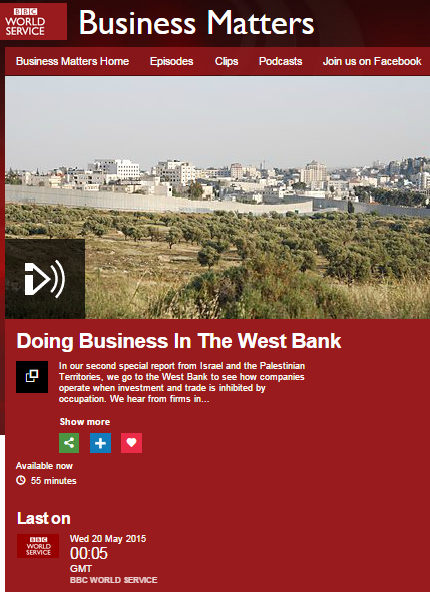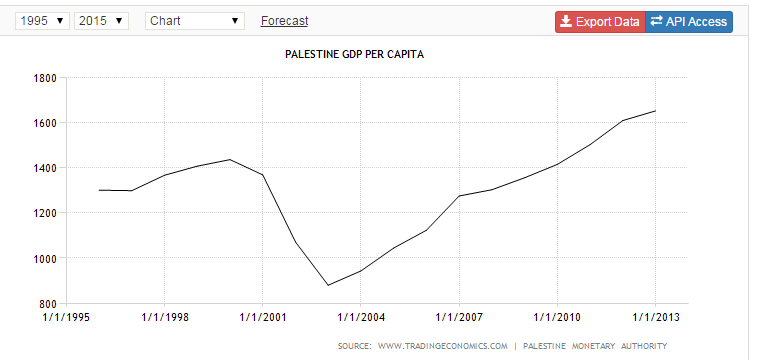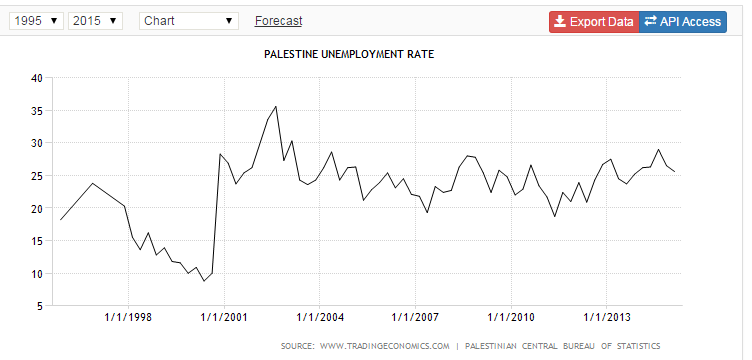Twenty years ago the internationally recognised representatives of the Palestinian people signed an agreement according to which land west of the River Jordan that was originally part of the territory designated by the League of Nations for the Jewish National Home but which had been conquered and occupied by Jordan between 1948 and 1967, would be divided into three zones. The Interim Agreement on the West Bank and the Gaza Strip defines those zones as Areas A, B and C with the latter being left under Israeli control pending permanent status negotiations between Israel and the PLO.
Those negotiations on topics including Jerusalem, refugees, settlements, security arrangements and borders began in 1996 but ran past their target date of May 4th 1999. Following the unsuccessful Camp David Summit in July 2000, the Palestinian Authority chose to initiate the war of terrorism known as the second Intifada. Although negotiations did continue for a time despite the extreme violence, the process was frozen in September 2003 following a major terror attack. In August 2005 Israel implemented its plan of disengagement from the Gaza Strip and areas in northern Samaria.
Throughout the twenty years since that interim agreement was signed, numerous attempts have been made to restart negotiations and several plans have been proposed including the Clinton Parameters and the 2008 Olmert Plan. In other words, had the Palestinian Authority wished to do so, it could have acquired control over the vast majority of Area C on several occasions over the last decade and a half by engaging in the negotiations to which the PLO originally committed itself in 1993.
However, members of the BBC World Service’s audience listening to the May 20th edition of ‘Business Matters’ – titled “Doing Business In The West Bank” – heard none of that very relevant context in the segment of the programme (from 26:39 in the link above) described in the synopsis as follows:
“In our second special report from Israel and the Palestinian Territories, we go to the West Bank to see how companies operate when investment and trade is inhibited by occupation. We hear from firms in Bethlehem and a tour guide in Jericho, as well as a representative from the Israeli authorities, and a World Bank official.”
In the final part of that segment (also available separately here) Roger Hearing interviewed Steen Lau Jorgensen – Country Director of the West Bank and Gaza for the World Bank – and listeners heard that ostensibly impartial source say:
“The closest we have to one number would be that if you look at Area C which is part of the West Bank – the 61% of the West Bank that’s still completely under Israeli control – by very conservative estimates, if Palestinians were given access to this and the private sector could flourish there, that would add a third to the Palestinian economy. And it would lower the Palestinian budget deficit by half. It’s very clear when you ask – and I’m sure, you know, we’ve heard from businessmen, from all sorts of people – that restrictions is the major constraint and that is – I mean restrictions not only on movement of people – restrictions on movement of goods.”
Roger Hearing later commented:
“The Israelis say that they are trying hard to work around this; they understand the problem but still they have major security fears which is the reason for the restrictions that they have. Does that ring true? Do you think that’s the way it is working?”
Listeners then hear the World Bank representative promote a dubious and evidence-free connection between unemployment and terrorism – although that word is of course not used here or anywhere else in this programme.
“It’s clear that what we’re seeing is that the Israeli restrictions are restricting economic activity and – you know – causing unemployment, causing – you know – underemployment. And we know from all the rest of the world that high unemployment is not good for peace and stability. I would think – and you hear voices on the Israeli side saying this as well – that the best thing for Israel’s long-term security, as well as a common interest, is a vibrant neighbour next door – right? […] It’s very rare that wealthy countries go to war with each other, right?”
As a look at unemployment rates and the GDP per capita in PA controlled areas over the last two decades clearly shows, the economy there was actually steadily improving and unemployment was falling when Arafat decided to launch the second Intifada in September 2000.
Passing up on the opportunity to properly inform listeners of, for example, the PA’s use of 6% of its budget for payments to convicted terrorists or the connections between rampant PA corruption, the rise of Hamas and the subsequent need for Israeli counter-terrorism measures, Roger Hearing makes do with the following bland tick of the impartiality box.
“But is it fair to blame the Israelis for what is in many areas a Palestinian homegrown problem? The Palestinian Authority – as most people admit – is not terribly efficient. There is corruption, there is misuse of funds. Is it any surprise really that they don’t have a more vibrant economy?”
Jorgensen’s reply again misleads listeners with regard to the status of Area C.
“Well first of all, the West Bank – in spite of not having access to more than half of their territory etcetera, etcetera, etcetera – has actually grown over the last 20 years pretty close to what middle-income countries have done. So they haven’t done too badly. They’re much better than their image outside.” [emphasis added]
Those familiar with the reports frequently produced by the World Bank will not have been in the least surprised by Jorgensen’s misrepresentation of the standing of Area C and his failure to note the fact that its status has yet to be determined and is currently pending the results of negotiations. In October 2013, just as Jorgensen took on his position, the World Bank published a paper titled “Area C and the Future of the Palestinian Economy” which – like many of the World Bank’s other reports – is based to no small extent on material provided by a plethora of political NGOs including Yesh Din, Gisha, ARIJ, B’Tselem, Bimkom and the Land Research Centre.
Unfortunately, Roger Hearing failed to correct the inaccurate impression given by his interviewee regarding the legal status of Area C just as he failed to relieve them of the misleading impression that terrorism is caused by unemployment. Moreover, whilst attributing the state of the economy in Palestinian Authority controlled areas to Israeli “restrictions”, Hearing made no attempt to accurately inform listeners what the phrase “major security fears” actually means.
Bearing in mind that BBC audiences suffer from consistent under-reporting on the subject of Palestinian terrorism and that stories such as the rise of Hamas in PA administered areas or the seizure of 5 million shekels worth of money intended to fund terrorism in 2014 alone are rarely covered by the BBC, it is imperative for any accurate and impartial report on the Palestinian economy to include such essential background information. This BBC World Service report failed to deliver, instead sticking to a well-trodden but misleading political narrative in which Palestinians are portrayed as passive victims devoid of all responsibility for their choices.
The rest of this programme will be discussed in a future post.
Related Articles:






